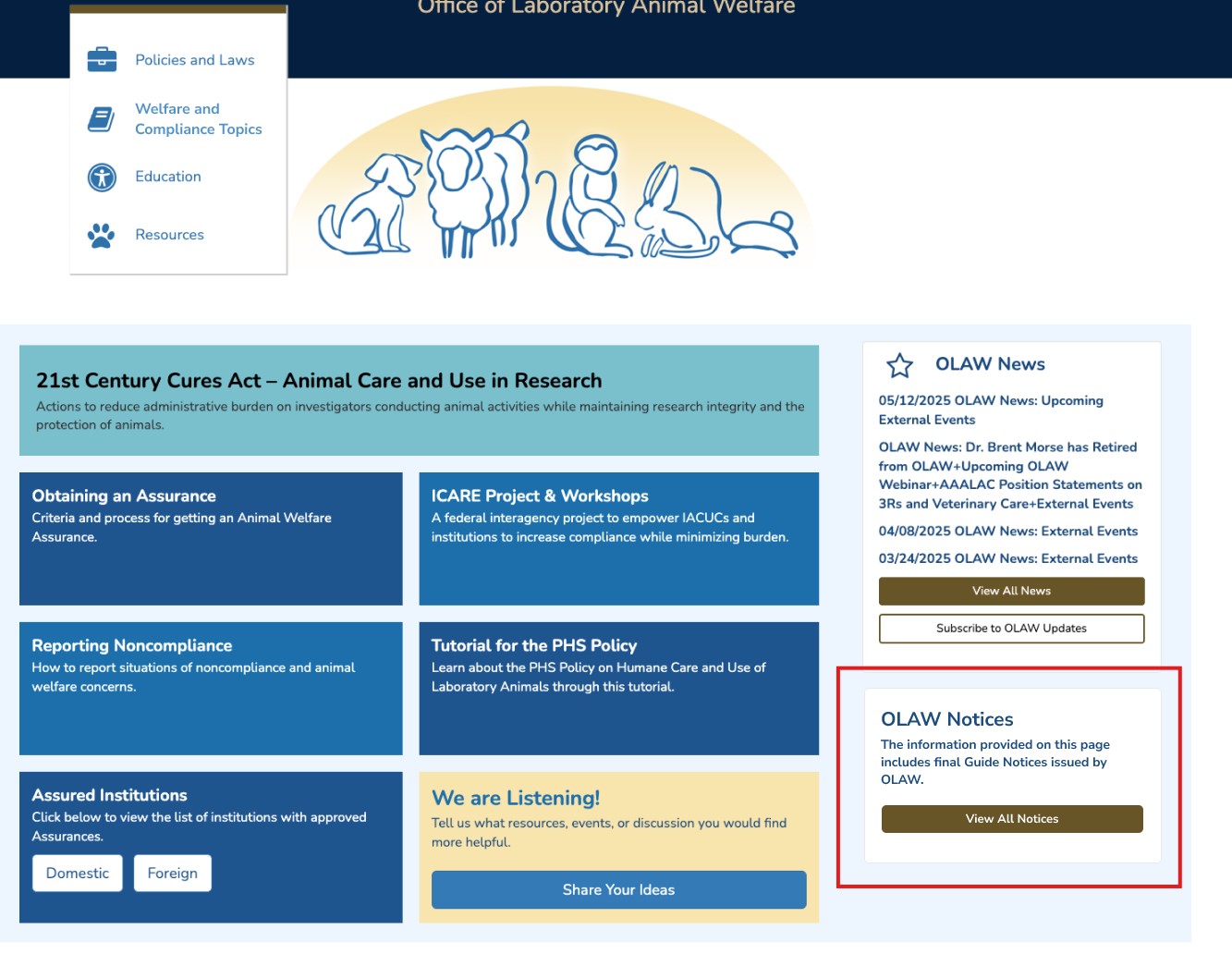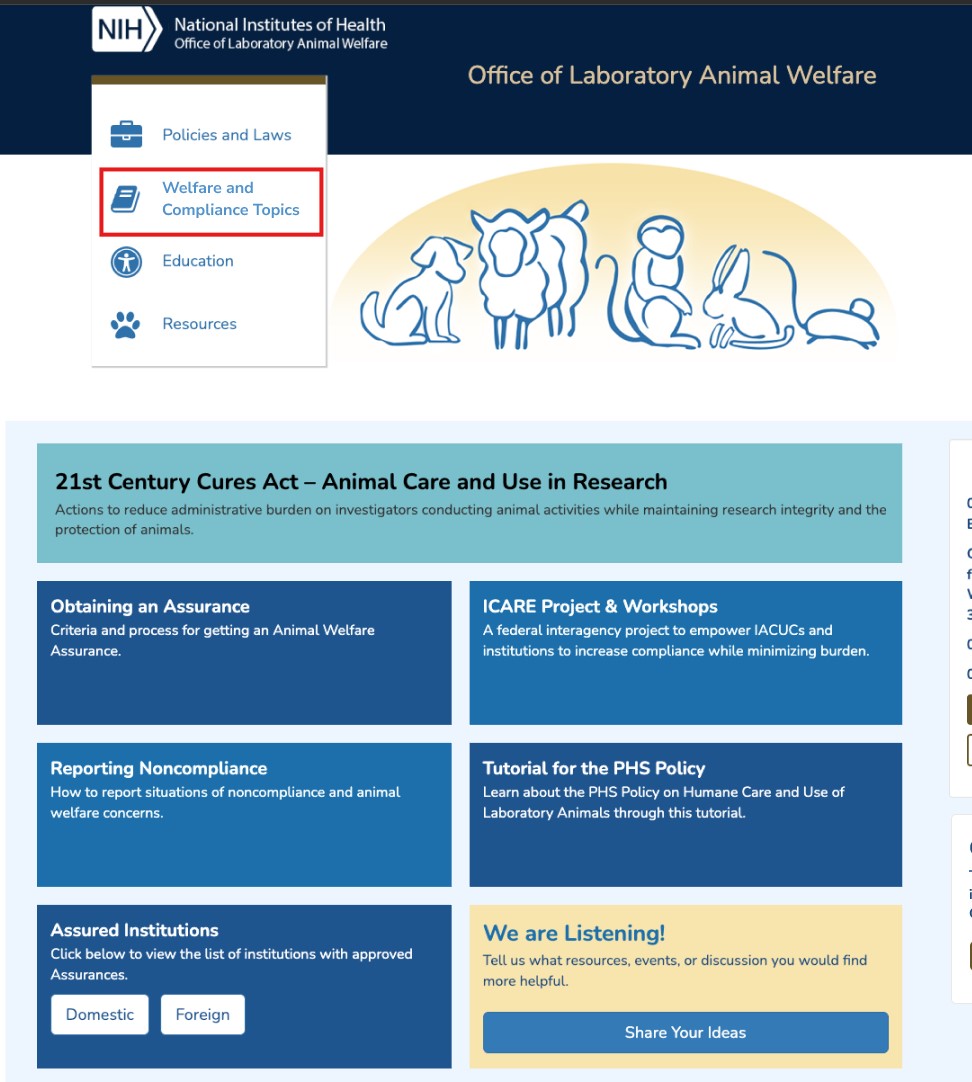In this issue:
- Outline Format Option for Semiannual Checklist
- National Academies of Science, Engineering, and Medicine (NASEM) Webinar on the Avian Flu Response
- IACUC 101 Plus Virtual Workshop – Save the Date!
- AWIC Workshops- Meeting the Requirements of the Animal Welfare Act
- SCAW Training Workshop
- The 3Rs Collaborative & IQ MPS Webinar Series
________________________________________
Outline Format Option for Semiannual Checklist
In response to community feedback, OLAW has adjusted the semiannual program review and inspection sample checklist to be organized in an outline format, rather than bullets. This was done to reduce administrative burden for IACUCs and administrators when referring to specific parts of the checklist in correspondence and reports. Hyperlinks and typos were also corrected. There were no substantive changes to the content or overall organization of material in the list.
The new format is available on the OLAW website on the Semiannual Program Review and Facility Inspection Checklist webpage, in the same location as the previous version. The old bulleted format can still be requested by sending an email to [email protected].
As a reminder, OLAW offers the sample checklist as a service to the community, but use of this specific document is not required. Institutions are encouraged to amend it as necessary to reflect institutional programs and needs, and they may also develop their own checklist. However, if the checklist is modified, it should be periodically reviewed to be sure that relevant topics are considered as the animal care and use program changes.
See the New Format
________________________________________
National Academies of Science, Engineering, and Medicine (NASEM) Webinar on the Avian Flu Response
March 27, 2025 | 2:00-4:00PM ET | Virtual
Join the NASEM Health and Medicine Division for a public webinar titled “Building Trust in the H5N1 Response: Perspectives from the Field.” Attendees will hear from agriculture producers and workforce health specialists on opportunities to build trust for a unified avian influenza (H5N1) response. In preparation for the webinar, individuals who have been involved in response to the ongoing outbreak are invited to share their experiences and perspectives on building trust between agriculture producers and public health officials.
Learn More and Register
About: The National Academies of Sciences, Engineering, and Medicine provide independent, objective advice to inform policy with evidence, spark progress and innovation, and confront challenging issues for the benefit of society.
Information regarding this external event is provided as a courtesy. Please direct all questions to the host organization.
________________________________________
IACUC 101 Plus Virtual Workshop – Save the Date!
April 1-2, 2025 | Virtual
The IACUC 101 Plus Workshop will be held virtually over 2 six-hour days on April 1 and 2, 2025. This workshop explores IACUC fundamentals appropriate for new and seasoned IACUC members, IACUC affiliates, and individuals responsible for their institution's animal care program. The course provides a basic yet comprehensive overview of the laws, regulations, and policies that govern the humane care and use of research animals.
Register Here
About IACUC 101: The IACUC 101 Series is an educational program designed to provide IACUC members, administrators, veterinarians, animal care staff, researchers, regulatory personnel, and compliance officers information about the role and responsibilities of the IACUC, including an understanding of federal policies and regulations governing laboratory animal welfare. The faculty consists of nationally recognized experts and representatives from private and academic biomedical research institutions, OLAW, USDA, and AAALAC International.
Information regarding this external event is provided as a courtesy. Please direct all questions to the host organization.
________________________________________
AWIC Workshops- Meeting the Requirements of the Animal Welfare Act
- April 9-10, 2025 | 1:00-4:30PM ET | Virtual
- On Demand Workshop (Ongoing, Virtual)
Want to learn how to conduct a literature search for the 3Rs (replacement, reduction, and refinement of animal use) in 2025? The Animal Welfare Act (AWA) regulations require principal investigators to provide Institutional Animal Care and Use Committees (IACUCs) with documentation demonstrating that their activities do not unnecessarily duplicate previous experiments and that alternatives to procedures that may cause more than momentary pain or distress to the animals have been considered (9 C.F.R. § 2.31 (d)(1)(ii-iii)(2024)).
The objectives of the workshop are to provide:
- An overview of the AWA and its regulations as they pertain to considering alternatives;
- A review of the 3Rs (replacement, reduction, and refinement of animal use) alternatives concept and examples;
- Guidance for where to find 3Rs literature and resources;
- Instruction on database literature searching techniques (e.g. search syntax); and
- A demonstration of an alternatives literature search.
Check out AWIC's training webpage for more information about the event and the on-demand offerings.
Learn More
About AWIC: The Animal Welfare Information Center (AWIC) was established in 1986 as part of the U.S. Department of Agriculture's (USDA) National Agricultural Library (NAL) in Beltsville, Maryland. As a library service, AWIC provides information, products and services related to the improved care and use of animals in research, testing, and teaching as described in the Animal Welfare Act.
Information regarding this external event is provided as a courtesy. Please direct all questions to the host organization.
________________________________________
SCAW Training Workshop
April 23, 2025 | In-person | Houston, TX
This in-person event will be held at the Houston Methodist Research Institute in Houston, TX. More about the program, schedule, speakers, and registration can be found on the SCAW website.
Learn More
About SCAW: The Scientists Center for Animal Welfare (SCAW) is dedicated to balancing animal welfare and excellence in basic and applied scientific inquiry. SCAW’s workshops further that mission by providing training from experts in animal research, including investigators, laboratory animal veterinarians, and representatives from the USDA, NIH OLAW, and AAALAC International.
Information regarding this external event is provided as a courtesy. Please direct all questions to the host organization.
________________________________________
The 3Rs Collaborative & IQ MPS Webinar Series
- Webinar 1: March 26 & 27, 10AM-12PM ET
- Webinar 2: May 27 & 29, 10AM-12PM ET
- Webinar 3: Sept 30 & Oct 1, 10AM-12PM ET
- Webinar 4: Dec 3 & 4, 10AM-12PM ET
The 3Rs Collaborative has announced dates for the 3RsC & IQ MPS webinar series! Make sure to mark them in your calendar. Each webinar will consist of a series of short, 15-minute, data-driven presentations overviewing each company’s commercially available, tissue-specific MPS models and related expertise.
Check out 3Rs Collaborative training webpage for more information.
Learn More
Information regarding this external event is provided as a courtesy. Please direct all questions to the host organization.










 ________________________________________
________________________________________